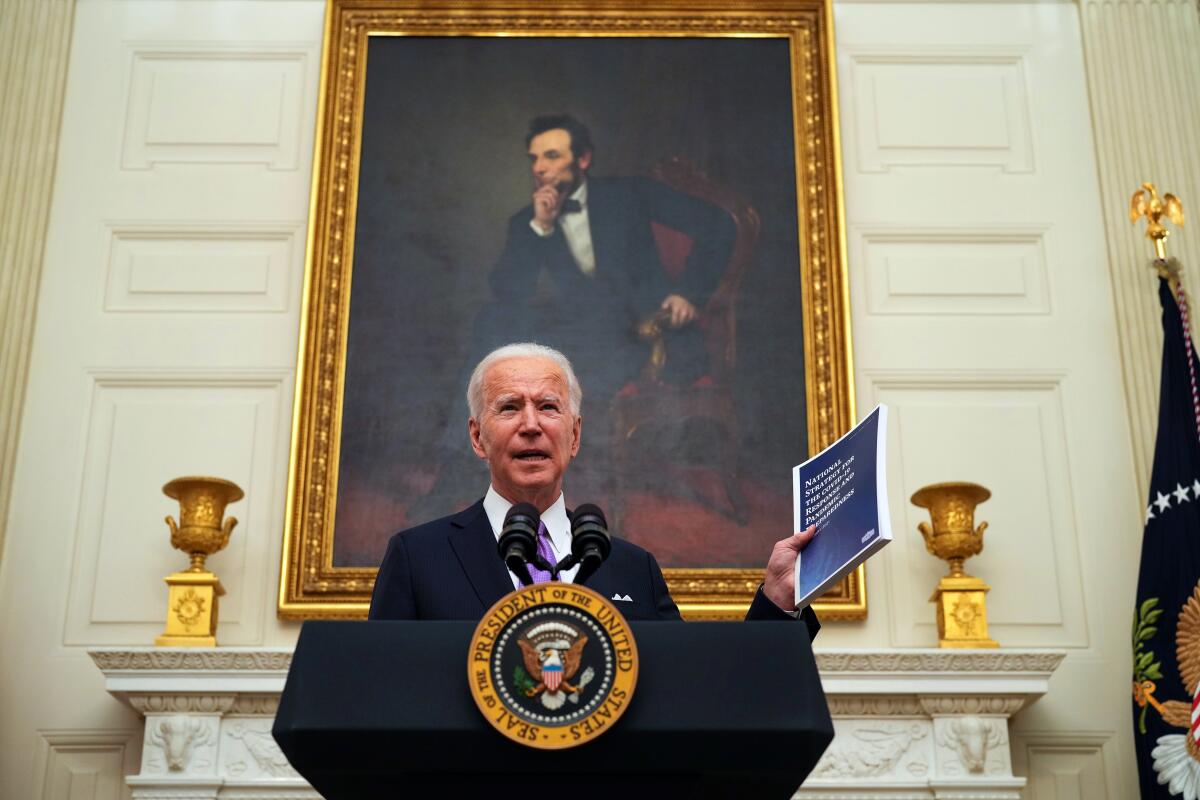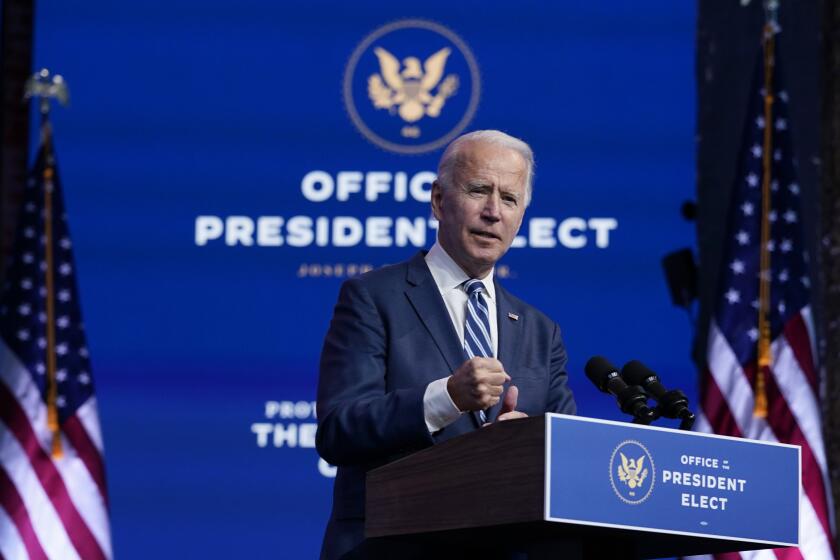Editorial: Congress has to seize the moment Biden has given it to fix immigration

- Share via
Amid his first wave of actions after his inauguration Wednesday, President Biden took direct aim at the nation’s dysfunctional immigration system by rescinding some of the Trump administration’s more extreme approaches to enforcement and pushing Congress to finally adopt comprehensive reforms. That’s a refreshing — and responsible — change from his predecessor’s unconscionably nativist approach.
Biden seeks to embrace a humane and pragmatic view of immigration reform. The executive directives halt further construction of President Trump’s vanity wall along the U.S.-Mexico border; reinvigorate the Obama-era Deferred Action for Childhood Arrivals program that Trump sought to end; lift the entry ban on people from about a dozen countries, most with significant Muslim populations; and withdraw an order that ramped up immigration sweeps in the interior of the country.
The inauguration of Joe Biden means more than just a change in administration. It means an escape from Trump’s relentless demand for attention.
Separately, the Department of Homeland Security announced a 100-day suspension of deportations as it reviews procedures and a freeze on new enrollments in the program that requires border-crossing asylum seekers to remain in Mexico, though it did not offer relief for the 60,000 asylum seekers currently stranded along the border. In a sense, the new directives reset federal polices to those of the Obama administration, which is good enough for now.
Biden’s more ambitious efforts lie within the bill he proposed to Congress this week, the U.S. Citizenship Act of 2021. Among other things, the measure would let some 11 million people now living in the shadows apply for temporary legal status and provide them an eight-year path to citizenship. That is both the strength of the proposal and its major friction point.
A main argument against such “amnesty” is that it encourages migrants to come in without permission in the hope of staying below the radar until the next amnesty comes along. But sweeping amnesties such as what Biden proposes are rare — the last major one came in the Reagan administration — and the reality is that our immigration enforcement has been ineffective for so long that the U.S. is now home — yes, home — to millions of people without authorization.
Rousting them all, as the hard-liners advocate, would be impossible to achieve and damaging to the country. As of 2017, half of all unauthorized immigrants had lived in the U.S. for at least 15 years, according to the Pew Research Center, and their tenure has likely only increased since then. Many have American spouses, American dependents, and contribute to their communities and the economy (including owning businesses that employ Americans). There is nothing to be gained from kicking them out now. Immigration reform must reflect that reality while also ensuring that migrants who credibly pose a risk to public safety do not remain.
Trump’s sweeping enforcement policies have left us with a backlog of 1.3 million cases in immigration courts, which is more than double the backlog he inherited from Obama, with the average wait time of 2.4 years for pending cases. Offering temporary legal status and a path to citizenship would radically reduce that caseload and the delay in resolving cases.
Congress has failed for years to fix our broken immigration system. Biden’s immigration proposals could give the members a chance to redeem themselves.
Biden also would use financial aid again to try to stabilize the governments and economies of Guatemala, Honduras and El Salvador, where migrants have been leaving in the tens of thousands to escape crime and grinding poverty exacerbated by the effects of climate change, including two major hurricanes this season in a matter of weeks. Reducing the “push factors” is an important part of the mix, though even Pollyanna would recognize that endemic corruption in the region is a strong headwind to success.
Other elements of Biden’s proposal call for developing better technological methods to monitor the U.S.-Mexico border, improving processing of new arrivals at ports of entry and expanding efforts to counter international trafficking in people and drugs. The plan doesn’t give as much attention to border security as conservatives typically demand, however. And based on overviews of the proposal, it appears to ignore the problem of people who arrive legally but then don’t leave once their visa expires, which accounts for half of the people who fall into unauthorized status.
One notable component missing from Biden’s proposed legislative reforms: dismantling the nation’s unnecessary, inhumane and mostly privatized system for detaining immigrants, part and parcel of a longstanding (and bipartisan) U.S. policy that some people desperately seeking asylum or the chance for a better life must be deprived of their freedom while the government considers their cases. But the vast majority of detainees pose no risk of fleeing or threatening public safety, and depriving them of their freedom because they seek protections is grotesquely unjust.
There are, of course, no quick fixes to the broken immigration system, which rivals the tax code in its complexity. The specifics of Biden’s proposed legislation will emerge and be debated in the coming weeks or months, and we fervently hope the reform effort doesn’t get caught up in the same web of resistance that has doomed previous efforts. A Democratic president proposing an immigration overhaul to a Congress in which not even the Democrats are unified means this will be a long slog. But Congress must seize the moment.
More to Read
Updates
5:29 p.m. Jan. 21, 2021: This editorial was updated to clarify the nature of the nations affected by Trump’s travel ban.
A cure for the common opinion
Get thought-provoking perspectives with our weekly newsletter.
You may occasionally receive promotional content from the Los Angeles Times.












